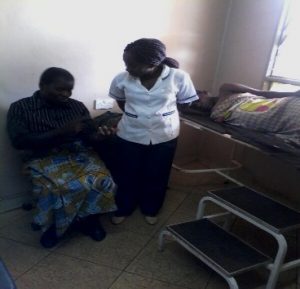International Day of the Midwife: Midwives, Mothers and Families are Partners for Life

A midwife providing postnatal health education to mothers. Photo Courtesy of White Ribbon Alliance.
By Nancy Kamwendo, White Ribbon Alliance for Safe Motherhood Malawi
Midwives everywhere understand that by working in partnership with women and their families they can support them to make better decisions to have a safe and fulfilling birth. Today, May 5, the world commemorates their day – the International Day of the Midwife.
In Malawi, midwives are frontline providers of maternity care, safely delivering babies, providing comprehensive sexual and reproductive health services, and playing a critical role in addressing health issues in their communities. Malawi has made progress in reducing its maternal mortality rate to 439 deaths per 100,000 live births, down from 574 deaths per 100,000 live births in 2010. This rate remains far too high – to save more lives of women and newborns, midwives must become even stronger partners with mothers seeking care and their families to best support them.
Bwaila hospital is a maternity facility located in Lilongwe, the capital city of Malawi. “This is the busiest maternity hospital in Malawi and probably in central Africa,” said Nemma Uzeni Phiri a Unit Matron at Bwaila. Prenatal care from a skilled provider is important to monitor pregnancy and reduce morbidity and mortality risks for the mother and child during pregnancy, delivery, and the postnatal period (within 42 days after delivery). According to Nemma, the fewer than 20 midwives of Bwaila clinic attend to approximately 700 women on Mondays and from three to as many as 400 women the other days of the week. About 50 babies are delivered per 24 hours with two shifts of six midwives per team. Despite the work overload, Midwives at Bwaila hospital work hard every day to ensure mothers and their families receive the quality care that they deserve. Cecilia Kapheni, a midwife and team leader of one of the midwife teams at Bwaila labor ward, said, “My team of six midwives conducts about 30 deliveries per shift. Women come to the labor ward escorted by their mothers and mother in-laws, we interact with the family members throughout labor and delivery. We involve them to assist us in comforting the woman as labor progresses. We work under very strenuous conditions; we do not have time to rest throughout the 9-hour day day shift or 15-hour for night shift. However, the arrival of the new born in the world is my great motivator and when the baby is born, seeing both the mother and family members happy, makes my day. Despite the poor working conditions, I love being a midwife.”
Many factors prevent women in Malawi from getting medical advice or treatment for themselves when they are sick. Barriers that women face in seeking care during pregnancy and at delivery include: getting permission to go for treatment from either their husband or other family members according to their culture; distance to health facility and transport cost; and not wanting to go to the hospital alone. Considering that access to proper medical attention and hygienic conditions during delivery can reduce the risk of complications and infections that may lead to death or serious illness for the mother, baby, or both, a midwife comes in as an educator, a counsellor, an advocate, and a skilled birth attendant. Midwives partner with the mother and family members to deal with these barriers. Midwives sensitize the families to allow and encourage mothers to seek care even if the one responsible to provide permission is not available. One man from Kang’oma village said, “I don’t have powers to take my wife to the hospital even when we see that she is in labour unless the older women at the household say so. If we leave without their consent, and something wrong happens, I am held responsible. So even if the women are not available, we still have to wait for them. They take labor and delivery as a no go zone for men, a field for women only and only them have to make decisions.” Midwives provide birth preparedness education at the prenatal clinic so that families prepare for birth. Mothers are encouraged to come to the clinic with their husbands so that they go through the education session together. Midwives encourage families to save money for transport and to buy other necessities for the delivery. Midwives encourage women coming from very far from the hospital to come to the waiting homes at the eighth month of pregnancy. This way when labor starts, they are close to the hospital and assisted by a skilled birth attendant. Spouses are encouraged to escort their wives to the hospital for delivery together with any female relations. Because the husband is not allowed inside the labour ward due to privacy reasons, female relations are encouraged to come and assist women throughout labor.
All of this promotes the partnership between the midwife, mother and families in taking care of women during pregnancy, labor, delivery and postnatal period. Happy mothers, happy families, happy midwives; indeed a partnership for life.

